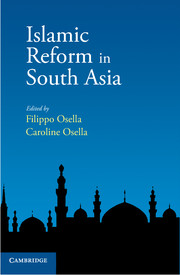Book contents
- Frontmatter
- Contents
- List of Contributors
- Introduction
- Part I Reformist Journeys
- Part II Debating Reform
- Part III Everyday Politics of Reform
- Part IV Reform, State and Market
- 15 Cosmopolitan Islam in a Diasporic Space: Foreign Resident Muslim Women's Halaqa in the Arabian Peninsula
- 16 Jamaat-i-Islami in Bangladesh: Women, Democracy and the Transformation of Islamist Politics
- 17 Secularism Beyond the State: The ‘State’ and the ‘Market’ in Islamist Imagination
- Index
16 - Jamaat-i-Islami in Bangladesh: Women, Democracy and the Transformation of Islamist Politics
from Part IV - Reform, State and Market
Published online by Cambridge University Press: 05 January 2014
- Frontmatter
- Contents
- List of Contributors
- Introduction
- Part I Reformist Journeys
- Part II Debating Reform
- Part III Everyday Politics of Reform
- Part IV Reform, State and Market
- 15 Cosmopolitan Islam in a Diasporic Space: Foreign Resident Muslim Women's Halaqa in the Arabian Peninsula
- 16 Jamaat-i-Islami in Bangladesh: Women, Democracy and the Transformation of Islamist Politics
- 17 Secularism Beyond the State: The ‘State’ and the ‘Market’ in Islamist Imagination
- Index
Summary
A man came to Allah's Apostle and said, ‘O Allah's Apostle! Who is more entitled to be treated with the best companionship by me?’ The Prophet said, ‘Your mother.’ The man said, ‘Who is next?’ The Prophet said, ‘Your mother.’ The man further said, ‘Who is next?’ The Prophet said, ‘Your mother.’ The man asked for the fourth time, ‘Who is next?’ The Prophet said, ‘Your father.’ (Narrated by Abu Huraira, Sahih Bukhari, Vol. 8, Book 73, No. 2)
In his waaz mahfils (public lectures) attended by thousands of women and men throughout Bangladesh, prominent Jamaat-i-Islami (Society of Islam) leader and former parliamentarian Delawar Hussain Saidi routinely discussed the above hadith as part of his effort to highlight the importance attached by the Quran, the Prophet Muhammad, and Islam itself to the role of the mother in Muslim society, and the privileged status of women generally in Islam. Interestingly, he used the verb ‘to serve,’ transforming the man's question into ‘Whom shall I serve?’ He repeatedly punctuated his lectures on women with the question, ‘Have women come out as winners or losers under Islam?’ And, invariably, the audience responded loudly and enthusiastically, ‘Winners!’
In this essay, I argue that, around the turn of the century, leaders of the Jamaat-i-Islami in Bangladesh regularly invoked women's privileged status as mothers—as in the hadith cited above—to counter the claims of the largely secularist non-governmental organizations (NGOs) operating in the country that Islam has been harmful to women and the only route to progress is to discard the shackles of religion and tradition.
- Type
- Chapter
- Information
- Islamic Reform in South Asia , pp. 445 - 471Publisher: Cambridge University PressPrint publication year: 2013
- 3
- Cited by

